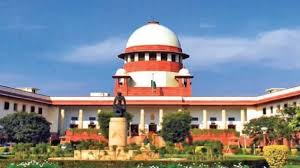NEW DELHI: Noting that economic offences stand on a different footing than other offences and have wider ramifications, the Supreme Court has refused to quash a corruption case based on the settlement reached between the accused and the SBI that had allegedly suffered a loss of Rs 6.13 crore.
“Economic offences affect the economy of the country as a whole and pose a serious threat to the financial health of the country. If such offences are viewed lightly, the confidence and trust of the public will be shaken,” a Bench of Justice Vikram Nath and Justice Punjab Varale said.
The Bench said the terms of settlement recorded by the parties at the Debt Recovery Tribunal (DRT) proceedings could not erase the offence committed by the accused. “In this case, it is on record that consent terms were submitted by the parties before the DRT. It is admitted that the bank had suffered around Rs 6.13 crore losses. Hence, a substantial injury was caused to the public exchequer and consequently it can be said that public interest has been hampered,” it said.
“Keeping in view that in the present case a special statute i.e. the Prevention of Corruption Act has been invoked, we are of the view that quashing of offences under the said Act would have a grave and substantial impact not just on the parties involved, but also on the society at large,” the SC said.
The Bench dismissed Anil Bhavarlal’s petition challenging a Bombay High Court’s July 26, 2023, order refusing to quash a case of corruption, cheating and fraud against him and other accused.
The appellants – Directors of Sun Infrastructure Pvt Ltd and some employees of SBI – were facing criminal charges over allegations of fund diversion, fraudulent valuation of collateral and irregular loan repayment.
The accused contended that a settlement had been reached between the accused and the bank before the DRT and accordingly, the criminal case should be quashed. However, the Maharashtra Government argued that the settlement alone could not justify the quashing of a criminal case where societal interests were involved. Accepting the state’s submission, the top court refused to quash the case.


